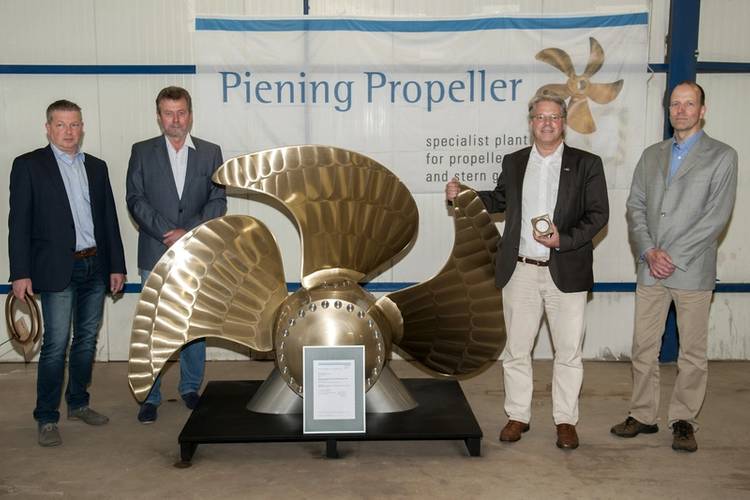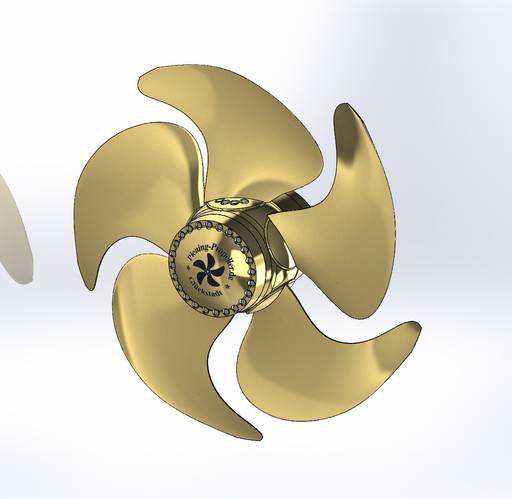Otto Piening GmbH, a member company of the DEUTSCHE YACHTEN working group, is venturing for the first time into the development of controllable pitch propellers that can be operated using a water-based hydraulic system in place of oil.
This environmentally-friendly, world-first has now been certified by classification society DNV GL and approved for the megayacht market as well as for research, naval and coastguard vessels.
More than two million pitch adjustment cycles under full power and one-and-a-half years of intensive in-house development work at Piening Propeller are behind this invention. Wear and tear has been exceptionally low. Specially coated high-performance composite materials in the areas subjected to the greatest mechanical stresses have resulted in excellent test results. A patent is pending for this novel technology, which will be presented to the public at the International Trade Fair for Shipbuilding, Machinery & Marine Technology (SMM) which takes place from September 6-9, in Hamburg.
Water as a hydraulic fluid offers users a whole range of benefits. Firstly, it is of course cost-efficient, readily available in most of the world and can furthermore be easily stocked. In the rare event of a system leak there is no risk to the environment, which means that the vessel is able to continue its journey. Conversely, the entry of seawater into the hydraulic system is also comparatively not critical. There are absolutely no legal restrictions relating to the operational area, and water, as a lubricant, is in any case nonflammable.
“Our Type PCP controllable pitch propellers have, however, been optimized in further areas,” explained managing partner Mathias Pein, who has been pursuing the development of this product since 2013 following numerous customer requests. The hub, for instance, has not only been improved in respect of its hub/diameter ratio while taking hydrodynamic aspects into consideration – its structure has also been revised to allow easier assembly and disassembly of the blades and pitch control mechanism.
A further new feature is that the blades can be mounted to the inside or outside of the hub using bolts – as required or pursuant to regulations. The requisite components are identical for clockwise and counter-clockwise rotating propellers. This reduces the part count. Highly flexible seals at the blade roots together with the exclusive use of corrosion-resistant materials further characterize this type of propeller.
The exhaustive series of tests under close and stringent supervision by DNV GL, was performed using a five-blade controllable pitch propeller mounted on a 650-millimeter hub. The forces originating during testing equated to an output of 3,300 kW at 440 rpm.
Piening, a long-established firm founded in 1929 and based close to Glückstadt on the Elbe, had already obtained approval from DNV GL for a range of four different oil-lubricated controllable pitch propellers. These already highlighted the advantage of simplified servicing, because worn parts can be easily exchanged. The complex reworking of the hub, necessary on conventional pitch control mechanisms owing to their design, is not required. This means that the amount of time a vessel has to spend in dock is drastically reduced, because the hub does not have to be dismantled.
Dr. Olaf Richter from DNV GL presented the new certificate to Mathias Pein at the Piening factory in the Blomesche Wildnis municipality close to Glückstadt. This factory will manufacture the latest PCP range (Piening Controllable Propeller) which will be produced in a performance range from 500 to 10,000 kW. Four-blade propellers are also available. In addition to the design and manufacture of complete drive systems with fixed pitch propellers and the provision of servicing and repair for drive systems of all types, the company is once again shining with a real in-house innovation.
















